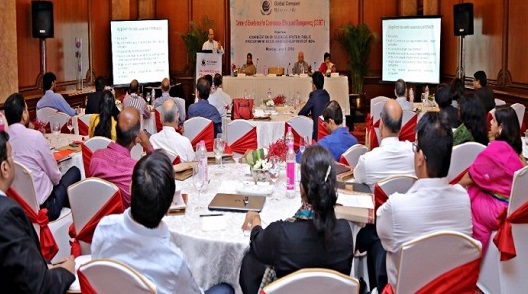Centre of Excellence for Governance, Ethics and Transparency (CEGET)

Global Compact Network India (GCNI) established the Centre of Excellence for Governance, Ethics and Transparency (CEGET) in March 2015, with the overall goal of developing a premier knowledge repository that ‘conducts innovative action research and training, provides a platform for dialogue and communication and facilitates systematic policy initiatives for strengthening transparency and ethics in business.’
CEGET has spearheaded two key initiatives - ‘Governance for Smart Cities’ and ‘Business inputs for Public Procurement Bill 2012.’
1. Governance for Smart Cities
In June 2015 Government of India launched the ‘100 Smart Cities’ Project, the key objective of which was to improve the infrastructure of the identified cities to efficiently handle and govern the increasing urban population. The significant differentiator of the Project is that instead of a top-down approach, citizens are encouraged to participate and contribute towards the vision development of their cities.
GCNI CEGET developed a pilot intervention for promoting the business case for transparency and anti-corruption as an integral part of the Smart Cities Project. Under this pilot plan, between December, 2015 to February, 2016, GCNI-CEGET facilitated five consultations in the cities of Visakhapatnam, Lucknow, Pune, Bhubaneswar and Ranchi.
On April 12, 2016 a ‘Conclave for Governance of Smart Cities: From Ambition to Action’ was held at Hotel Leela Palace, where participants from these cities, experts and business stakeholders were provided a platform to chart the future course of work in this initiative.
GCNI CEGET, in partnership with its Knowledge partners - ‘Legasis Services Private Limited’ and ‘VMC Management Consulting Private Limited’, has developed tools for compliance and Model Public Private Partnerships framework, which were launched at the event. These tools have been developed in response to the city specific needs, based on recommendations received from each city event. At the Conclave, CEGET also launched its website www.ceget.in, which would act as a knowledge hub for corporations, PSUs, government, civil society organisations and other stakeholders on issues of governance, ethics and transparency.
In the second phase of the Governance for Smart Cities initiative, CEGET is in consultation with three city special purpose vehicles (SPVs), to implement the tools that were showcased at the Conclave. The first major breakthrough successfully transpired in Pune, with the Pune Smart City Development Corporation Limited (PSCDCL) entering into a five-year Memorandum of Understanding with GCNI for providing advisory service on governance and compliance to the SPV created for the purpose of the Project, inclusive of a customised IT solution for governance and compliance and Advisory on Public Private Partnership. The MoU is effective from 1st July 2016 to 20th June 2021. This non-commercial MoU will ensure that PSCDCL operates in an effective and efficient manner, and attracts best investment to realise its mission.
2. Business Inputs for the Public Procurement Bill, 2012
Observing the revival of interest in the subject of public procurement by present Government, manifested by the Finance Minister’s reference in his Budget Speech of 2015 to a public procurement law on the UNCITRAL model to check “Malfeasance in public procurement”, followed by public consultations for introduction of changes in the Public Procurement Bill, 2012, CEGET developed an initiative for garnering business inputs for the PPB, 2012.
Prior to this, in April 2012, GCNI had organised a National Consultation on Transparency and Anti-Corruption Measures in Procurement in India, in partnership with United Nations Office of Drug and Crime (UNODC). At this event GCNI had facilitated the process of knowledge–sharing and supporting the work of businesses in creating transparent and ethical procurement practices in a proactive manner.
Presently GCNI CEGET’s Working Paper Business Recommendations for Public Procurement Legislation in India focuses on seven propositions around – Coverage, Competition, Transparency, Market Access, Grievance Review and Redressal, Probity and Sustainable Public Procurement. This paper was deliberated on at a Consultation at Hotel Taj Palace, New Delhi on June 6, 2016 and feedback received from experts and business stakeholders assisted in in developing a concrete list of business recommendations that would be shared with the government.
These recommendations are to be read in sync with the working paper as they complement each other. CEGET is in the process of developing policy solutions, based on these recommendations as well as industry good practices in procurement, and share it with appropriate authorities. We welcome suggestions from readers.


